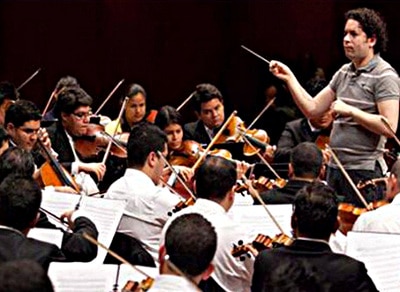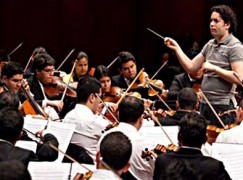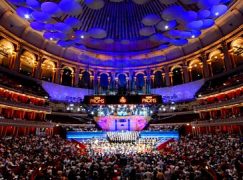Abuse in El Sistema is not only sexual
OrchestrasOur reader’s comment of the day comes from ‘Frau Geigerin’:
Abuse in El Sistema is not only sexual. Abuse is having players rehearse for over 10 hours a day (I gave lessons to young Venezuelan violinists who explained me that, as a punishment for poor performances or in preparation for tours, they were told that the rehearsal would last until the conductor said so); abuse is discriminating those who decide to study abroad; abuse is not allowing people to grow freely as artists by controlling what, who, and when… for players in El Sistema, It becomes everything, a family, and if they leave for whatever reason they are OUT and have nothing, no support, and have difficulties finding music jobs in a country where El Sistema is everything and everywhere.
I also encountered that El Sistema players often are very experienced in orchestra, understand how to work in orchestra, and know the orchestral repertoire. At the same time they often don’t know the solo and chamber repertoire, don’t develope music reading skills at the same level; and lack a good music theory and history knowledge foundation.
El Sistema causes admiration for its social success (not for the artistic, as some people like to think), but there is a very dark side in it.







I can tell you that everything Fray Geigerin is true. Every single word. I started very young in a nucleo, moving soon to Caracas to play in one of El Sistema main orchestras. It is true we have rehearsed 10 hours and even more and if we left the rehearsal then we would be out of the orchestra and someone else could take the position. Losing the position would mean losing all the network of support, medical care, transport, instrument support etc. You just can’t leave without finding you with nothing left, and with little perspectives of finding a job in music in a country that is so El Sistema infected. And if you leave, as I did when a teacher who gave a masterclass for us offered me a full scholarship to study with him, and El Sistema doesn’t aprove you are out and can’t come back.
And what Fray Geigerin sais about lacking knowledge it is true too. We almost are taught no theory or history, only just what we need to play the orchestra. I had to learnt all theory when studying abroad. And it is true too about solo repertoire… everything is designed on only one thing in mind, that is playing orchestra. The individual does not matter.
When you are inside El Sistema you can not see it, but when you are out it is clear how toxic it can be.
Sorry for my English.
If you have the wherewithal to study elsewhere, why do you want to go back to El Sistema? I always thought it was a social welfare program for the under-privileged as much as a music education program?
It’s not how many hours you put in but the intensity and focus while you practice. No question long hours only make you less proficient. Get ‘Practicing for Artistic Success’ by Burton Kaplan. Then you will understand what makes an artist.
From my experience, when orchestra rehearsals go for more than 5-6 hours a day it becomes counterproductive and mentally/physically wears down orchestra players. The 10 hours rehearsal thing sounds like your typical, deliberately abusive group cohesion practice emblematic of cults.
Gross and unoriginal stuff.
Both these comments are very accurate. I have written a book and lots of academic and media articles about the darker sides of El Sistema, so what the commenters say is hardly news. But many people in the classical music world don’t want to know and there’s an international field built on myths about El Sistema, so denial is rife and we keep going round and round with these kinds of revelations.
The real story of El Sistema has many troubling aspects, and it bears little resemblance to the one pumped out by the institution’s unparalleled PR machine and repeated by many journalists and documentary makers. Equally troubling is that no amount of evidence seems to shift some people’s minds. It beggars belief that lots of musicians who claim to be motivated by social justice also trumpet this abusive organization as an inspirational model. It’s hard to understand why there is so little response from the music sector to each new scandal or failure.
How many more years and how many more revelations will it take for people to finally wake up?
Your book grossly misrepresents the System. You hate it. It shows.
I have read your book 6 or 7 times and written a review, in French,
for Res Musica. You’re hardly an objective part.
hlm, Indian Wells, California
Thank you for illustrating my point.
Now read this, by one of the victims of sexual abuse in El Sistema:
“I wonder why they waited so long. This isn’t new. I just presented my testimonial, but in 2014 Geoff Baker published a book where he described the structures at El Sistema that allow the abuse, and concrete cases he collected in his interviews. Baker’s book was read, in Venezuela and abroad, as an attack against El Sistema. But at that moment I was being abused in the institution. If they would have taken action then, I would have been protected, as well as other people.”
https://www.caracaschronicles.com/2021/07/01/a-history-of-sexual-abuse-in-venezuelas-lauded-youth-orchestra-system/
Straight from a victim’s mouth. People like you who chose to interpret a warning signal as an attack, and to shoot the messenger rather than listen to the message, were complicit in the lack of action and the continuation of abuses. And you’re still doing it, constructing conspiracy theories instead of listening to the voices of Venezuelan musicians.
Sure some great soul conductors from abroad who promoted El Sistema with their wallet on the right pocket and their heart in their left pocket-the most convenient- forgot a few details about this organization…
Apparently El Sistema is a perfect fit for the political system of Venezuela. Authoritarian leadership (bordering on totalitarian), total control not just in musical terms, but over the entire life of the inmates/players, punishment for anyone who dares to dissent from the party line. This has nothing to do with right vs. left and everything with freedom vs. suppression.
Maybe so, but the modern Left in the USA is copying their totalitarian diktats like the clappers. Won’t be long now…
Call of your dogs please!!
Wtf????
STOP WATCHING FOX FAKE NEWS COMMENTARY!!
You sound like a brainwashed trumptarded IDIOT.
Just normal orchestral type abuse. The vileness of allowing dictatorships to continue to exist.
So many lives, personalities, and talents destroyed by perverse conductors.
I feel slightly abused by just having to see a certain conductor’s face far too often while browsing the new releases.
I know now who you are, Frau Geigerin!!! I miss you!!!
All true. https://van-magazine.com/mag/all-that-matters/
Yes, as we know, in most other impoverished Latin American countries, the students get much better educations in music theory and have shorter rehearsals in their world renowned orchestral training systems. And most of all, they are evil socialists.
“Evil socialists” is actually tautological.
There is the old saying that the first guy to invoke Hitler automatically loses the argument. Another sure loser is invoking socialism as a bogeyman. To begin with the word is all but meaningless. I was in the USSR (the second “S” stands for “socialist”) shortly before it collapsed. Much more recently, I was in Denmark, which has many economic policies that would certainly be described as “socialist” by Susie Sonata. I could hardly imagine two places in which the experience of daily life and the quality of governance are more different. When the same word describes both places, the word is clearly meaningless.
The free market fundamentalists who invoke the evils of socialism might do well to consider their local fire department. It is a nearly flawless example of Marxism come to life—we all pay into it and we all access it as needed, truly “from each according to his ability, to each according to his needs”, as Marx himself once put it. But some may prefer a more capitalistic approach.
As it happens, this was tried in the last days of the Roman Republic. A man named Crassus, who later was in Caesar’s first triumvirate, requisitioned a number of horses, buckets, and men, and started a for-profit fire brigade. He hit on a business model that today’s hedge fund managers could only drool over. If I may quote Wikipedia: “The first ever Roman fire brigade of which we have any substantial history was created by Marcus Licinius Crassus. Marcus Licinius Crassus was born into a wealthy Roman family around the year 115 BC, and acquired an enormous fortune through (in the words of Plutarch) ‘fire and rapine.’ One of his most lucrative schemes took advantage of the fact that Rome had no fire department. Crassus filled this void by creating his own brigade—500 men strong—which rushed to burning buildings at the first cry of alarm. Upon arriving at the scene, however, the fire fighters did nothing while their employer bargained over the price of their services with the distressed property owner. If Crassus could not negotiate a satisfactory price, his men simply let the structure burn to the ground, after which he offered to purchase it for a fraction of its value.”
Capitalism and socialism are both tools. Each works well in some situations and considerably less well in others. Neither is a one-size-fits-all answer to all economic issues.
Denmark’s PM states they are not socialist but free market.
https://www.youtube.com/watch?v=RO7wgS5tdz4
Sweden’s ex Prime Minister said socialism only destroys.
https://mises.org/power-market/swedish-ex-prime-minister-rebukes-bernie-socialism-only-destroys
What you are talking about is the welfare state model which does eventually collapse as the market system is milked dry.
The “evils” of capitalism is when businesses and government team up and force people to accept their goals. This is a form of fascism. Good examples are big banks, big tech (oh yes, they do the censorship for the state), closed unions, etc.
Forget about your “example.” Crassus owned hundreds of slaves, hardly capitalist.
I suggest you read about socialism from people who know. Mises, Rothbard, and many many others.
Of all books and one of the most enjoyable to read about the free market, this is the one I should have recommended first. Sorry.
https://www.amazon.com/Economics-One-Lesson-Shortest-Understand-ebook/dp/B003XT60KO/ref=sr_1_1?crid=1ER3G7ED4PZ3M&dchild=1&keywords=economics+in+one+lesson&qid=1625658838&sprefix=economic%2Caps%2C151&sr=8-1
Hayne writes: “Crassus owned hundreds of slaves, hardly capitalist.”
Huh? Owning slaves is entirely consistent with capitalism. There is nothing about capitalism which is hostile to a society which allows slaves to be owned; even if (almost) all modern societies, in theory, prohibit slave-owning.
A man’s body is his own property. A free market respects property rights. A government is supposed to (in theory) protect those rights. It’s only until recently where this has finally come about from the West.
Behind your irony, you’re saying that abuse doesn’t matter in Venezuela because it’s socialist and you like socialism. With friends like you the left doesn’t need enemies.
I admire your attempt to bring some perspective, that it has nothing to do with socialism, as little as that corporate politics, when they get tax breaks call it socialism, whether it is or not. You know, the same people that want Venezuela’s oil….
The corporations that want Venezuela’s oil work with the US government together to try to get what they want. That is fascism which is socialism.
Huh? Fascism really isn’t “stealing Venezuela’s oil”. And the US really is not “a fascist state” despite the miriad problems it has.
Hayne never said that the US was a fascist state, so if you want to play pin on the donkey regarding that, try where there’s one missing a tail. He was pointing out behavior, which he finds fascist, of that country.
“Huh?”
It’s amazing that “live” human beings can think such things, as if what happened in Iran with Mossadegh and “project ajax” and all the consequent corporate-military coups isn’t stealing anything and…..
As if statues abounding of whoever from whatever means one can’t think otherwise……
When Nelson Mandela had anything good to say about Castro, this was of course seen as scandalous, or perplexing. Cuba then could be seen as the only South American company that had stood up to American interference and exploitation, in contrast to so many other countries, Chile just to name one. And that wasn’t to glorify Castro, or his methods.
One can’t look at the problems in Venezuela, and then just dismiss US interventions, nor the bullying of the Wold Bank or IMF, sanctions, or corrupt CIA activity, and economic bullying. And when anyone mentions that, to have it AGAIN dismissed as if it’s excusing Maduro or Chavez, is quite irately banging on the drum of we-know-what-it-is-it’s-this-man-and-nothing-else. Add a salsa rhythm to that banging it still is lacking in perspective. Have such banging not make change it still isn’t the fault of those not going along with what will only look at one of a myriad of causes, actually excusing the others which impact more than just the one territory in question, and ARE global.
All of that, including some positive moments as well as lots of negative consequences, is a natural product and logical result of socialist-leaning way of thinking and related to it kind of mentality, especially when such ideas and actions are “supported” and reinforced or indeed enforced by oppressive dictatorial governments.
Not necessarily. Was it Menuhin who once commented that he found it ironic that the USSR’s élite music-education system struck him as optimised for training soloists rather than ensemble or orchestral players?
Quite possible and if so, then this is precisely why he found it ironic!
Very much like the Communist sports academies that produce automaton athletes for the glory of the motherland. They are recruited at very young age (7,8), forced to live in the academy dorms, often separated from parents. For those who participate n excel, lots of benefits such as stipends, apartments for family n personal glory. For those who don’t, banishment, cutoff all benefits n shame. Today not as bad as the bad ole days, but still a brutal regimen. Just look at the way China produces its gymnasts. Frightening.
Not so very different from the modern American Left and its institutional controls. Thought Policing 101.
The more things change the more they remain the same.
Try reading “El Sistema: Orchestrating Venezuela’s Youth” by Geoffrey Baker. He went to Venezuela and observed and did research. Very enlightening on this subject.
I was in El Sistema from the very beginning for 25 years! I can certified that all the matters related here is 100% true
The current political situation in Venezuela is making many people flee Venezuela, mostly to other South and Central American countries and to Europe (mostly to Spain).
Many of those who move to Europe are El Sistema-trained musicians hoping to find positions in orchestras and teaching music. Most of them find that the training and experience they bring is not enough to win a position in European professional orchestras and conservatoires. Of course, when there is a pool of musician so big as El Sistema, there are some people who are highly talented (and can find positions in professional orchestras and some even get conducting careers), but the majority of them, because of the lack of serious training, cannot compete in Europe. El Sistema is completely out of the realities of the music business, and for those arriving in Europe with the hope of freedom and a music career, the shock of reality is very strong. In Venezuela they had everything, and now they find they are not good enough to work in music in Europe.
Most people in Europe who go to a conservatory don’t manage to have a music career. That is the truth of the profession: far too many people are being trained for them all to get jobs and most have to do something else when their training has finished.
… then image how it is for those who did not attend good music conservatories, and lack serious training and education.
I can’t express how great it feels to see that finally, finally, finally, the abused are beginning to speak out. It has been exhausting and heartbreaking reading thousands of complaints in private over the past decade, but being powerless to do anything in the face of an industry hypnotised by this cult and the pre-packaged riches it brought with it. It has to stop. Let’s go back to making music for the sake of its inherent, needless-to-qualify-or-quantify beauty, depth, poetry and – therefore – self-evident advantage to all.
Let’s remove the burden from today’s music institutions that they also have to be social workers. Achieving social cohesion is not music’s job; participating in musical activities undoubtably bestows benefits, as does participation in any number of other activities, like sports. It doesn’t take a genius to figure out that all forms of art, culture, and cognitive stimulus are good for you, and those who participate in them will derive personal advantage from that participation. But we shouldn’t need to thrash the fake “saviour” narrative to death in order to raise money to make art. Or, if we do, our desperation indicates that we’ve already lost the cultural battle.
I say this as someone who was raised in a mining community, in which the volunteer spirit that produced brass bands and choirs on every corner was the fuel that drove the machine of culture across the entire working class. Nobody needed to invent clever marketing terms like “social program” in order organise around community music making. Music just happened, because leaders stood up in communities and made it happen. And from those grass-root endeavours sprouted the seed that led to a steady growth of world class professionals. Working class towns the world over have been famous for producing world class talent, from Siberia to Snowdonia, not because anyone flogged the myth of “social blah blah blah”, but because they organised around the foundational idea that art was self-evidently important as a human pursuit. In football, we can see an equivalency in Brazil, for example, where the same mentality generated the best players in the world from the streets, not from any dictatorial academy structure. Football was about self-expression, and that foundational value flowed through the the veins of the system all the way to the very top.
El Sistema’s mistake is that it is obsessively power hungry. It wants to rule all worlds within the music world, at home and abroad, from the amateur ranks to the education sector to the concert hall to the recording studio. It is a monopoly, in philosophy and structure. In order to achieve that, it needs dizzying sums of money to effectively buy its way past all other music organisations in the world, regardless of their musical superiority. Why would DG, for example, in the digital age of razor-thin margins, hire the Berlin Phil for a recording if it can get the Simon Bolivar for free? Why would a promoter NOT book an orchestra that comes fully loaded with its own oil-funded marketing team, its own press corp, its own travel and hotel budget and – most importantly – its own impossible-to-resist pre-scripted “saviour” narrative? Nobody can compete. But those dizzying amounts of money need to come from a State apparatus that has something to gain from the exchange – ideological propaganda, in Venezuela’s case – and from corporate sponsors who can claim virtue by association with the saviour narrative.
Hence the need to create myth. Myth is the key to the power game. But so, too, is abuse part of the m.o., and coercion, and control and subordination and fear and the dehumanisation of the individual to serve the collective design. It takes an authoritarian structure to fulfil this collective, monopolistic ambition on a global scale.
Now that we are beginning to understand what is going on, we can all decide which value system best suits us, and make our choices. It is heartening to see statements coming from ES franchises – some braver and more principled than others. I, for one, would like to see a return to art for art’s sake, and a return to the community spirit of old which made no claims to virtue, but just got on with it. I would like to see a world in which two ideas can be held aloft at the same time: that access to art ought to be a fundamental, unconditional provision for children across the globe; that the provision of that access to art must not be transactional, hijacked by regimes to serve ideological ends.
B R AV O !! Truer words … impossible. If I were to add to your “Myth is the key to the power game” I would underscore enabling forces: the influence buying of media with favourable editorial lines so as to promote the propaganda; the death of fact-checking in journalism to prevent darker truths from surfacing; the proliferation of social media that does not encourage critical thought; and the pervasiveness of virtue signalling, aided by a cancel culture that attempts to silence whomever calls out the offences to a dulled fray.
B R AV O !! Truer words … impossible. If I were to add to your “Myth is the key to the power game” I would underscore enabling forces: the influence buying of media with favourable editorial lines so as to promote the propaganda; the death of fact-checking in journalism to prevent darker truths from surfacing; the proliferation of social media that does not encourage critical thought; and the pervasiveness of virtue signalling, aided by a cancel culture that attempts to silence whomever calls out the offences to a dulled fray.
High time to “cancel” Dudamel, the multimillionaire? Let’s do it!
Maybe so. Has Dudamel commented on this?
No, he understands the need to stay out of politics. There are several other conductors of US orchestras (Tucson, San Diego) who are also products of ES and they remain silent.
Politics? This is about a culture of abuse.
Abuse at music institutions isn’t confined to El Sistema…
There’s a difference between an ideal and its practice. If El Sistema gets it wrong in practice, this does not diminish the ideal: making a difference in society through music making. May the knowledge of the wrongs be instructive for similar music programmes elsewhere, instead of demolishing the idea altogether.
Your comment elides the ideal of “making a difference through music-making” and the ideal that has inspired El Sistema programmes – but they clearly do not need to be the same. For many critics of El Sistema, it is not simply that it is the faulty realization of a worthy vision, but that there are many problems with the vision itself, not least the fact that it is more coherent as a PR strategy than a well-thought-through programme for music education, let alone social action on the scale required in Venezuela. The abuse documented by Geoff Baker and now being confirmed – sexual and otherwise – is not something that can be readily detached from a series of other disturbing features he describes: authoritarianism, secrecy, intolerance towards dissenting views, a heavy bias towards the Western orchestral canon or indeed the central “salvation” narrative. (Disclosure: I research ES and have taught on a Sistema-based programme).